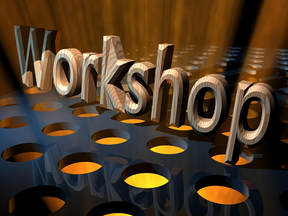Workshop Model for Secondary Science
|
What is the Workshop Model for Science?
Like Readers' Workshop, Writers' Workshop, and and Math Workshop, the Workshop Model for Secondary Science is intended to give teachers a framework in which to engage students with discussion, hands-on and minds-on time in a single class period. |
The Workshop Model helps teachers to incorporate the (SEPs)
Science & Engineering Practices |
What teachers say about the Workshop Model for Science:
"It raises the level of student interest." "It causes the closure of the class period to be intentional." "It takes the boring out of class!" "The chunks of time aid in their planning." "It allows for more rigorous discussion and thought without becoming overwhelming to students." |
Workshop Model for Secondary Science
Mini-Lesson 10-20 minutes |
Teacher introduces the day’s topic with a question. The question should be relevant, thought-provoking, and open-ended. The question should be related to the student’s prior learning. Teachers may require students to write the question and some of the responses. Brief notes can be given during this time. *Students may be required to write the questions and the of the responses in their science journal. *Current news/issues related to course content help provide relevance and increase student interest. *Questions need to be so open-ended that no conclusion is reached. The period of time should result in student learning. Possibilities include: -Questions may evoke scientific argumentation. (SEP 7) -Questions may require a calculation. (SEP 5) -Questions may require a quick online search. (SEP 8) -Questions may lead to further questions. (SEP 1) |
Independent Work MS: 10-20 minutes HS: 20-30 minutes |
Students are assigned a task to work on alone. During this time the teacher moves about the room to assist students, as needed. Possible tasks include: -Students complete a virtual lab. (SEPs 3, 4, 8) -Read and answer questions from the Textbook or other source. (SEPs 1, 4, 7, 8) -Draw and label a diagram of related content. (SEP 2) -Study a given chart or graph, write a list of observations, conclusions, or questions. (SEP 4) -Read a passage, write conclusions. (SEP 8) -Read the summary of a scientific investigation, write conclusions. (SEP 3) -Write the plans for a scientific investigation on a given topic. (SEP 3) -Read about a phenomena. Offer an explanation and support for the explanation. (SEP 6) -Work on practice problems. (SEP 5) -Watch a video, take notes, answer questions. (SEPs 6, 7, 8) For convenience and preference, Independent Work time and Small Group Work time may be interchanged. |
Small Group Work MS: 10-20 minutes HS: 20-30 minutes |
Students, in groups of no more than 4, are given actual materials to study a given topic. Possible tasks include: -Plan an investigation for the next day. (SEP 3) -Conduct an investigation. (SEP 3) -Measurement (direct or derived). (SEP 5) -Construct a device to certain specs. (SEP 9) -Perform a task, collect and arrange data. (SEPs 4, 5) -Solve a real problem. (SEP 9) |
Sharing 5-10 minutes |
Teacher guides whole class to share what they learned based on mini-lesson discussion, independent work, and small group work. Teacher clears up any misconceptions from the day. Possible tasks include: -Teacher calls on a 3-4 individuals to share out. (SEPs 1, 8) -Teacher calls on 1-2 groups to share out. (SEPs 1, 8) -Teacher asks guiding questions to help students shape final conclusions. (SEPs 1, 8) |
References:
-Reader's Workshop.org. (n.d.). Retrieved January 2, 2018, from http://www.readersworkshop.org/
-Says, M., Says, C. C., & Says, M. K. (2016, March 22). Launching Your Math Workshop. Retrieved January 2, 2018,
from https://www.thecurriculumcorner.com/thecurriculumcorner123/2015/08/launching-your-math-workshop/
-Reader's Workshop.org. (n.d.). Retrieved January 2, 2018, from http://www.readersworkshop.org/
-Says, M., Says, C. C., & Says, M. K. (2016, March 22). Launching Your Math Workshop. Retrieved January 2, 2018,
from https://www.thecurriculumcorner.com/thecurriculumcorner123/2015/08/launching-your-math-workshop/
Please post your comments about the
Workshop Model for Secondary Science below.
Workshop Model for Secondary Science below.
Developed by Kimberly G. Massey, 2018


